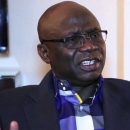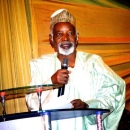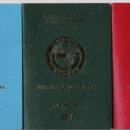Keziah Jones explains why his superhero alter ego and tormentor of Nigeria's nefarious powers is closer to Fela Kuti than Superman
Two thugs chase their prey down a dark alley, only for a mysterious caped crusader to intervene, saving the innocent victim from some brutish injustice. It's a scene familiar to any reader of superhero comic strips – but this isn't Metropolis, Gotham City or Spider-Man's Manhattan. It's downtown Lagos, and with this shift of locale come a few key changes: the "thugs" are a pair of cops, the "innocent victim" a purse-snatcher. And the "caped crusader" sports not neon Spandex long-johns, but a spartan costume of face-paint, rags, basketball boots and judiciously wielded umbrellas.
His name is Captain Rugged, star of a new graphic novel (accompanied by an album of the same name) that's the creation of Nigerian musician Keziah Jones, who feasted on American superhero comics in his youth, but noticed that – besides Marvel's Black Panther, the first black superhero and ruler of the fictional African nation Wakanda, with whom Jones couldn't identify – there were no African superheroes.
"I started wondering: What would an African superhero be like?" Jones remembers. "When you translate the superhero concept to the African context, funny things happen. Superman is fine in Metropolis: he rights wrongs, and defeats the bad guy, and flies away. Simple. In Nigeria, he'd have to deal with the police, armed robbers, politicians, and navigate a much more complicated political and moral terrain."
Along with the grit and pace of the Lagos underworld, Jones wanted to capture the city's unique landscape, which, he writes in the foreword, is "as visually arresting as London, Paris and New York; it just happens to be arresting in a different way".
"Lagos was a grand project, an idea that never quite got finished," he tells me. "In the 70s there was a lot of construction, because we had oil money – a mass springing up of modern buildings, really futuristic architecture. But in the 80s, everything crashed, so a lot of it was left unfinished. We have gleaming skyscrapers right next to swamps and houses on stilts, bridges that don't go anywhere. Then there's old Lagos, where the Brazilian slaves who returned to Africa to rejoin their families built houses in the Portuguese colonial style. Then you have the ghettoes, people living in shacks they built themselves. Together it looks amazing. Like, 'after the future'. There's something strange and beautiful about it."
To bring Lagos to the comic-book page, Jones teamed up with artist Native Maqari, a fellow Nigerian expat who moved to America as a youth, and now lives in Paris. "We came from similar backgrounds," says Jones, who himself moved to the UK aged eight to attend boarding school. "Native had also read loads of comics as a kid, and we shared similar ideas, similar questions about what it meant to be Nigerian." Together with playwright Biyi Bandele-Thomas, Jones and Maqari refined the concept and plot, and Maqari relocated to Lagos for three months' research.
They focused on Makoko, the central location for Captain Rugged, an impoverished coastal village on land coveted by the leisure resort industry, which serves as Captain Rugged's shadowy chief villain. "Makoko's located beside the Third Mainland Bridge [which connects Lagos Island to the mainland], one of the longest bridges in Africa," Jones says. "It's this community of houses on stilts, populated by fishermen and timber merchants. They speak French, they have their own chief, and the police don't go in there. They have their own law."
Captain Rugged's plot involves nefarious interests seeking to sweep the Makoko people off their land, in a world where "land is the new oil", as one villain says. In 2012, as Jones and Maqari worked on the graphic novel, dozens of the stilt-houses were demolished by authorities clearing the slums, which were labelled an "environmental nuisance, [a] security risk and an impediment to the economic and gainful utilisation of the waterfront".
Reading on mobile? Watch Keziah Jones's video for Afronewave here
This means a trickier adversary than Superman ever faced, and Captain Rugged possesses no superpowers to call upon; instead, he must inspire the people to unite and stand up for themselves. To the two journalists who admiringly track Rugged's endeavours, he's reminiscent of the executed activist Ken Saro-Wiwa: without power but still standing up for his people against multinational industry. Jones sees a further comparison to Afrobeat pioneer Fela Kuti, who faced down the Lagos government with music as his only weapon.
"Fela was larger than life," remembers Jones. "He was a superheroic figure, locked in a battle with the powers that be. Fela told us we could free our minds, that we didn't have to take what was given to us." Jones's words echo the villainous Oga's perturbed reaction to Captain Rugged's heroic vigilantism in the graphic novel: "He is starting to make common people feel important."
Jones hails from the same corner of Lagos as Kuti, and interviewed him at his compound in 1996, a year before Kuti died; the interview itself has since been turned into a comic strip. But it wasn't until his move to England that his love for music truly developed. "I was sent to England at the age of eight," Jones says. "I didn't speak English, I came from a different culture. I had to learn how to change my behaviour to fit in … It was traumatic. But music really helped. I could use poetry, metaphors and symbols, bend English around to say what I wanted to say."
It took a fellow boarder at school to introduce Jones to the music he later forged a career in. "He was astonished that, as an African, I knew nothing about the blues," laughs Jones. "He made me tapes of Charley Patton, Robert Johnson, Buddy Guy and Jimi Hendrix. I loved them. I studied them."
The latter, along with Funkadelic founder George Clinton, was a strong influence on the young Jones, who grew his hair long and let his schoolwork suffer while spending hours with his guitar. "I came from a very strict, traditionalist family," he says, "but they weren't around to interfere. Whenever I'd come home to Nigeria, I'd have to conform: cut my hair, behave. I had at least a few different identities going on within myself. Playing music and writing songs was a way of resolving a lot of questions in my mind."
University held no attraction for Jones; instead, he says he "basically absconded, wandering London for a few years, busking." On the streets and in tube station corridors, he learned to perform and sing, and developed a dynamic, percussive guitar-style, a brash groove that would be heard above the traffic. "I took from African-American music anything I could relate to Yoruba [people] and reclaimed it, making something new from it."
His style, which he calls "blufunk", was coined on 1992's Blufunk Is a Fact!, the first of Jones's six studio albums, the most recent of which is a suite of songs to soundtrack Captain Rugged. In the video for the album's opening track, Afronewave, Jones dressed up as Captain Rugged, strutting about Lagos. "We filmed it in a market on a Friday, and I was swarmed by kids and criminals and cops, asking me things, like: 'What's your superpower?'"
It's not a bad question, actually. What is Captain Rugged's superpower?
"The power to reinvent himself," he says, after a moment. "He creates 'Captain Rugged', he makes people believe in him, makes something happen. And that's what I want to champion most about African life, that for all the struggles, people are still surviving, still having babies, still making great music and art. Against all odds, man, the people do survive."




